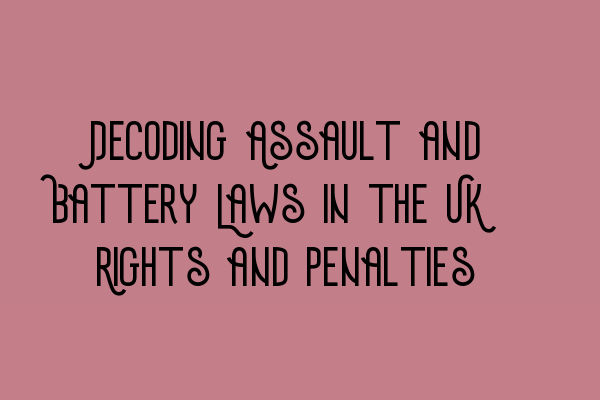Decoding Assault and Battery Laws in the UK: Rights and Penalties
As solicitors specializing in criminal law, we often receive questions about assault and battery laws in the UK. The terms assault and battery are frequently used together, but they have distinct meanings and legal consequences. In this blog post, we will delve into the intricacies of assault and battery laws, discuss the rights of individuals involved, and shed light on the penalties one may face. Let’s dive right in!
Understanding Assault
Assault, in the context of criminal law, refers to the intentional act of causing another person to apprehend immediate and unlawful violence. It is important to note that assault does not require any physical contact to occur. Rather, it focuses on the reasonable fear or anticipation of physical harm that the victim experiences.
Instances of assault can include verbal threats, aggressive gestures, or attempts to strike someone without making physical contact. The key element is the victim’s perception of the threat and the belief that immediate harm is likely to happen.
Some common assault-related offenses include common assault, assault occasioning actual bodily harm (ABH), and assault with intent to cause grievous bodily harm (GBH). Each offense carries different penalties and will be addressed by the legal system accordingly.
Understanding Battery
Battery, on the other hand, involves the actual physical contact between the perpetrator and the victim. It refers to the intentional and unlawful application of force onto another person. Unlike assault, the victim does not need to fear or anticipate violence; physical contact is the defining factor.
Acts of battery can range from a simple push or slap to more severe acts resulting in severe injuries. The severity of the offense will determine the legal consequences the perpetrator may face.
Rights of Individuals Involved
If you find yourself involved in an assault or battery case, it is crucial to be aware of your legal rights. Whether you are the accused or the victim, you have fundamental rights that must be protected.
If you are the victim, you have the right to report the incident to the police and request legal action. Victims of assault or battery may also be entitled to compensation for any physical or emotional harm suffered as a result of the incident. Seeking legal representation is highly recommended to ensure your rights are upheld throughout the legal process.
As the accused, you have the right to legal counsel, the presumption of innocence until proven guilty, and the opportunity to present your defense. It is essential to consult an experienced criminal solicitor who can guide you through the legal complexities and assist in building a robust defense strategy.
Penalties for Assault and Battery
The penalties for assault and battery vary depending on the severity of the offense and the specific circumstances surrounding the case. Here are some general guidelines:
Common Assault: This offense is considered the least serious and carries a maximum penalty of 6 months imprisonment and/or a fine. However, less severe cases may result in community service or a conditional discharge.
Assault Occasioning Actual Bodily Harm (ABH): If the assault causes injuries requiring medical attention, it is categorized as ABH. The maximum penalty for ABH is 5 years imprisonment.
Assault with Intent to Cause Grievous Bodily Harm (GBH): GBH involves intent to cause serious harm or permanent disfigurement. This offense carries a maximum penalty of life imprisonment.
It is crucial to remember that these penalties serve as guidelines, and each case is assessed individually based on its unique circumstances. Your criminal solicitor will analyze the details of your case and work towards achieving the best possible outcome for you.
Conclusion
Decoding assault and battery laws in the UK may seem complex, but with the right legal support and understanding of your rights, you can navigate through the legal process effectively. If you have been a victim or find yourself accused in an assault or battery case, we urge you to seek professional legal advice and representation.
At SQE Criminal Law & Practice Law UK, we have a team of experienced solicitors who can provide expert guidance and support throughout your legal journey. Our SQE 1 and SQE 2 preparation courses can equip aspiring solicitors with the knowledge and skills needed to excel in criminal law. Check out our related articles for more information:
- SQE 1 Practice Exam Questions
- SQE 1 Practice Mocks FLK1 FLK2
- SQE 2 Preparation Courses
- SQE 1 Preparation Courses
- SRA SQE Exam Dates
If you require legal assistance or have any questions regarding assault and battery laws in the UK, do not hesitate to contact SQE Criminal Law & Practice Law UK. We are here to help!
